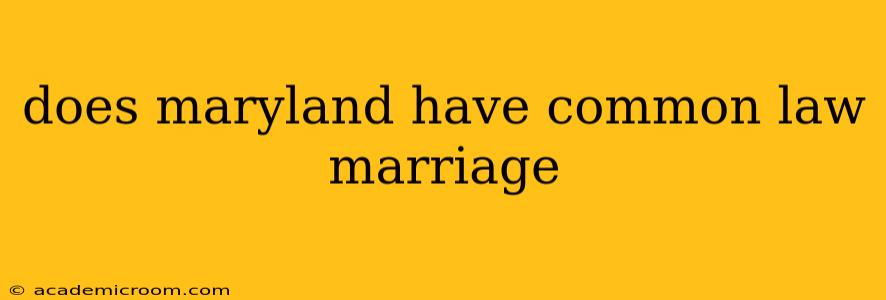Maryland, like many states, once recognized common-law marriages, but that's no longer the case. Understanding the history and current legal standing of common-law marriage in Maryland is crucial for anyone considering a relationship or facing legal complexities. This comprehensive guide will address the key questions surrounding this topic.
What is Common-Law Marriage?
Common-law marriage, also known as informal marriage, is a legal union formed without a marriage license or formal ceremony. It's based on the couple's agreement to be married and their presentation of themselves as husband and wife to the public. Historically, certain states allowed these unions to be legally recognized, but the requirements varied greatly.
Did Maryland Ever Recognize Common-Law Marriage?
Yes, Maryland previously recognized common-law marriages. However, Maryland abolished the ability to enter into a new common-law marriage effective October 1, 2005. This means that no new common-law marriages can be formed in the state after this date.
What if a Couple Was in a Common-Law Marriage Before 2005?
If a couple established a common-law marriage in Maryland before October 1, 2005, their marriage remains legally valid. However, proving the existence of a common-law marriage from before that date can be challenging and requires substantial evidence.
What Evidence is Needed to Prove a Common-Law Marriage in Maryland (Pre-2005)?
Proving a pre-2005 common-law marriage in Maryland requires demonstrating the following:
- Cohabitation: The couple must have lived together.
- Agreement to Marry: There must be clear and convincing evidence that the couple agreed to be married. This isn't simply living together; it requires a mutual understanding and intent to be married.
- Holding Themselves Out as Married: The couple must have publicly presented themselves as husband and wife to friends, family, and the community. This could include joint bank accounts, tax filings, shared property ownership, and other evidence.
The burden of proof rests heavily on the couple claiming the common-law marriage. This often requires presenting substantial documentation and testimony.
Can I Still Get Married in Maryland Without a Ceremony?
While you cannot enter into a common-law marriage in Maryland, you can still get married without a formal ceremony. Maryland allows for civil ceremonies performed by authorized officiants, eliminating the need for a religious ceremony. However, obtaining a marriage license from the state remains mandatory.
What Happens if I Believe I Was in a Common-Law Marriage Before 2005?
If you believe you were in a common-law marriage before October 1, 2005, and need to establish this for legal purposes (such as inheritance, divorce, or benefits), you should immediately consult with an experienced Maryland family law attorney. They can help you gather necessary evidence and navigate the legal complexities involved.
What are the Legal Implications of a (Pre-2005) Common-Law Marriage in Maryland?
The legal implications of a valid pre-2005 common-law marriage in Maryland are the same as for a formally married couple. These implications can include:
- Property Rights: Shared ownership of property and assets.
- Inheritance Rights: Rights to inherit from the spouse upon death.
- Spousal Support: Eligibility for spousal support in case of separation or divorce.
- Tax Benefits: Filing taxes jointly and other tax benefits for married couples.
Disclaimer: This information is for educational purposes only and should not be considered legal advice. Consult with a qualified legal professional for advice tailored to your specific situation. Laws can change, so it's crucial to seek up-to-date legal guidance.
